Mohamed ElBaradei
Appearance
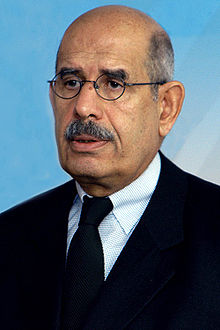
Mohamed ElBaradei [Arabic: محمد البرادعي] (born 17 June 1942) is an Egyptian diplomat, and the Director General of the International Atomic Energy Agency. ElBaradei and the IAEA were jointly awarded the Nobel Peace Prize of 2005.
Quotes
[edit]Breaking the Cycle (2003)
[edit]- An interview in the Cairo Times (23 October 2003)
- My father taught me that you have to stand by your principles. He was president of the bar association and was preaching civil liberties and human rights during some of the most repressive years of the Nasser era. He was the focus of a lot of pressure and intimidation, but he stood by his principles. And I think that's a lesson I remember from him — that you stand up for what you believe in.
- Unilateral preemption should not in any way be the model for how we conduct international relations... [It] brings us into very dangerous territory and it could be used and abused by any other country. We need to continue to base our security on multilateralism, and on the Security Council.
- I think we need to continue working hard on developing a nuclear weapons free zone in the Middle East... unfortunately things are not going in the right direction right now. We need to understand that without comprehensive peace in the Middle East, we have no security.
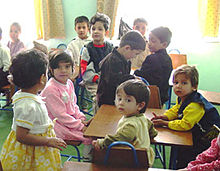
- You remember that book called All I Really Need to Know I Learned in Kindergarten? … Well that's very much true. I find a lot in common in the way I manage things and the way she manages three-year olds. We humans are the same when we are three years old and when we are 50!
- Comparing his work as an international diplomat to that of his wife, Aida Elkachef, a kindergarten teacher, with a mention of the book by Robert Fulghum.
- I very much believe that we share the same human values... If you scan through all the religions — monotheistic and others — they all preach the same... I think all our fights, our wars, and all our disagreements are just expressions of frustration at our human condition at a particular time. I don't think it has to do with us believing in different values.

- I think the ultimate sense of security will be when we come to recognize that we are all part of one human race. Our primary allegiance is to the human race and not to one particular color or border. I think the sooner we renounce the sanctity of these many identities and try to identify ourselves with the human race the sooner we will get a better world and a safer world.
Saving Ourselves From Self-Destruction (2004)
[edit]- Op-Ed essay published in The New York Times (12 February 2004)
- Nuclear proliferation is on the rise. Equipment, material and training were once largely inaccessible. Today, however, there is a sophisticated worldwide network that can deliver systems for producing material usable in weapons. The demand clearly exists: countries remain interested in the illicit acquisition of weapons of mass destruction.
If we sit idly by, this trend will continue. Countries that perceive themselves to be vulnerable can be expected to try to redress that vulnerability — and in some cases they will pursue clandestine weapons programs. The supply network will grow, making it easier to acquire nuclear weapon expertise and materials. Eventually, inevitably, terrorists will gain access to such materials and technology, if not actual weapons.
If the world does not change course, we risk self-destruction.
- A fundamental part of the non-proliferation bargain is the commitment of the five nuclear States recognized under the non-proliferation treaty — Britain, China, France, Russia and the United States — to move toward disarmament. Recent agreements between Russia and the United States are commendable, but they should be verifiable and irreversible. A clear road map for nuclear disarmament should be established — starting with a major reduction in the 30,000 nuclear warheads still in existence, and bringing into force the long-awaited Comprehensive Nuclear Test Ban Treaty.
- We must abandon the unworkable notion that it is morally reprehensible for some countries to pursue weapons of mass destruction yet morally acceptable for others to rely on them for security — and indeed to continue to refine their capacities and postulate plans for their use.
Similarly, we must abandon the traditional approach of defining security in terms of boundaries — city walls, border patrols, racial and religious groupings. The global community has become irreversibly interdependent, with the constant movement of people, ideas, goods and resources. In such a world, we must combat terrorism with an infectious security culture that crosses borders — an inclusive approach to security based on solidarity and the value of human life. In such a world, weapons of mass destruction have no place.
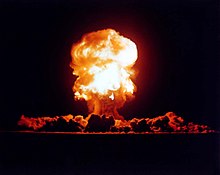
Nobel lecture (2005)
[edit]- The International Atomic Energy Agency and I are humbled, proud, delighted and above all strengthened in our resolve by this most worthy of honours.
- My sister-in-law works for a group that supports orphanages in Cairo. She and her colleagues take care of children left behind by circumstances beyond their control. They feed these children, clothe them and teach them to read.
At the International Atomic Energy Agency, my colleagues and I work to keep nuclear materials out of the reach of extremist groups. We inspect nuclear facilities all over the world, to be sure that peaceful nuclear activities are not being used as a cloak for weapons programmes.
My sister-in-law and I are working towards the same goal, through different paths: the security of the human family.
- Why has this security so far eluded us?
I believe it is because our security strategies have not yet caught up with the risks we are facing. The globalization that has swept away the barriers to the movement of goods, ideas and people has also swept with it barriers that confined and localized security threats.
- A recent United Nations High-Level Panel identified five categories of threats that we face:
1. Poverty, Infectious Disease, and Environmental Degradation;
2. Armed Conflict — both within and among states;
3. Organized Crime;
4. Terrorism; and
5. Weapons of Mass Destruction.
These are all 'threats without borders' — where traditional notions of national security have become obsolete. We cannot respond to these threats by building more walls, developing bigger weapons, or dispatching more troops. Quite to the contrary. By their very nature, these security threats require primarily multinational cooperation.

- What is more important is that these are not separate or distinct threats. When we scratch the surface, we find them closely connected and interrelated.
We are 1,000 people here today in this august hall. Imagine for a moment that we represent the world's population. These 200 people on my left would be the wealthy of the world, who consume 80 per cent of the available resources. And these 400 people on my right would be living on an income of less than $2 per day.
This underprivileged group of people on my right is no less intelligent or less worthy than their fellow human beings on the other side of the aisle. They were simply born into this fate.
In the real world, this imbalance in living conditions inevitably leads to inequality of opportunity, and in many cases loss of hope. And what is worse, all too often the plight of the poor is compounded by and results in human rights abuses, a lack of good governance, and a deep sense of injustice. This combination naturally creates a most fertile breeding ground for civil wars, organized crime, and extremism in its different forms.
In regions where conflicts have been left to fester for decades, countries continue to look for ways to offset their insecurities or project their 'power'. In some cases, they may be tempted to seek their own weapons of mass destruction, like others who have preceded them.
- Fifteen years ago, when the Cold War ended, many of us hoped for a new world order to emerge. A world order rooted in human solidarity — a world order that would be equitable, inclusive and effective.
But today we are nowhere near that goal. We may have torn down the walls between East and West, but we have yet to build the bridges between North and South — the rich and the poor.
- Consider our development aid record. Last year, the nations of the world spent over $1 trillion on armaments. But we contributed less than 10 per cent of that amount — a mere $80 billion — as official development assistance to the developing parts of the world, where 850 million people suffer from hunger.
- My friend James Morris heads the World Food Programme, whose task it is to feed the hungry. He recently told me, "If I could have just 1 per cent of the money spent on global armaments, no one in this world would go to bed hungry."
- It should not be a surprise then that poverty continues to breed conflict. Of the 13 million deaths due to armed conflict in the last ten years, 9 million occurred in sub-Saharan Africa, where the poorest of the poor live.
- Consider also our approach to the sanctity and value of human life. In the aftermath of the September 2001 terrorist attacks in the United States, we all grieved deeply, and expressed outrage at this heinous crime — and rightly so. But many people today are unaware that, as the result of civil war in the Democratic Republic of the Congo, 3.8 million people have lost their lives since 1998.
Are we to conclude that our priorities are skewed, and our approaches uneven?
- There are three main features to this changing landscape: the emergence of an extensive black market in nuclear material and equipment; the proliferation of nuclear weapons and sensitive nuclear technology; and the stagnation in nuclear disarmament.
Today, with globalization bringing us ever closer together, if we choose to ignore the insecurities of some, they will soon become the insecurities of all.

- As long as some of us choose to rely on nuclear weapons, we continue to risk that these same weapons will become increasingly attractive to others.
I have no doubt that, if we hope to escape self-destruction, then nuclear weapons should have no place in our collective conscience, and no role in our security.
To that end, we must ensure — absolutely — that no more countries acquire these deadly weapons.
We must see to it that nuclear-weapon states take concrete steps towards nuclear disarmament.
And we must put in place a security system that does not rely on nuclear deterrence.
- Are these goals realistic and within reach? I do believe they are. But then three steps are urgently required.
First, keep nuclear and radiological material out of the hands of extremist groups. … we are in a race against time.
Second, tighten control over the operations for producing the nuclear material that could be used in weapons. Under the current system, any country has the right to master these operations for civilian uses. But in doing so, it also masters the most difficult steps in making a nuclear bomb.
To overcome this, I am hoping that we can make these operations multinational — so that no one country can have exclusive control over any such operation....
Third, accelerate disarmament efforts. We still have eight or nine countries who possess nuclear weapons. We still have 27,000 warheads in existence. I believe this is 27,000 too many.
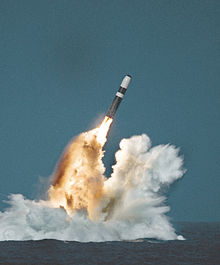
- A good start would be if the nuclear-weapon states reduced the strategic role given to these weapons. More than 15 years after the end of the Cold War, it is incomprehensible to many that the major nuclear-weapon states operate with their arsenals on hair-trigger alert — such that, in the case of a possible launch of a nuclear attack, their leaders could have only 30 minutes to decide whether to retaliate, risking the devastation of entire nations in a matter of minutes.
- These are three concrete steps that, I believe, can readily be taken. Protect the material and strengthen verification. Control the fuel cycle. Accelerate disarmament efforts.
But that is not enough. The hard part is: how do we create an environment in which nuclear weapons — like slavery or genocide — are regarded as a taboo and a historical anomaly?

- Whether one believes in evolution, intelligent design, or Divine Creation, one thing is certain. Since the beginning of history, human beings have been at war with each other, under the pretext of religion, ideology, ethnicity and other reasons. And no civilization has ever willingly given up its most powerful weapons. We seem to agree today that we can share modern technology, but we still refuse to acknowledge that our values — at their very core — are shared values.

- I am an Egyptian Muslim, educated in Cairo and New York, and now living in Vienna. My wife and I have spent half our lives in the North, half in the South. And we have experienced first hand the unique nature of the human family and the common values we all share.
Shakespeare speaks of every single member of that family in The Merchant of Venice, when he asks: "If you prick us, do we not bleed? If you tickle us, do we not laugh? If you poison us, do we not die? And if you wrong us, shall we not revenge?"
And lest we forget:
There is no religion that was founded on intolerance — and no religion that does not value the sanctity of human life.
Judaism asks that we value the beauty and joy of human existence.
Christianity says we should treat our neighbours as we would be treated.
Islam declares that killing one person unjustly is the same as killing all of humanity.
Hinduism recognizes the entire universe as one family.
Buddhism calls on us to cherish the oneness of all creation.
Some would say that it is too idealistic to believe in a society based on tolerance and the sanctity of human life, where borders, nationalities and ideologies are of marginal importance. To those I say, this is not idealism, but rather realism, because history has taught us that war rarely resolves our differences. Force does not heal old wounds; it opens new ones.
- I have talked about our efforts to combat the misuse of nuclear energy. Let me now tell you how this very same energy is used for the benefit of humankind.
At the IAEA, we work daily on every continent to put nuclear and radiation techniques in the service of humankind. In Vietnam, farmers plant rice with greater nutritional value that was developed with IAEA assistance. Throughout Latin America, nuclear technology is being used to map underground aquifers, so that water supplies can be managed sustainably. In Ghana, a new radiotherapy machine is offering cancer treatment to thousands of patients. In the South Pacific, Japanese scientists are using nuclear techniques to study climate change. In India, eight new nuclear plants are under construction, to provide clean electricity for a growing nation — a case in point of the rising expectation for a surge in the use of nuclear energy worldwide.
These projects, and a thousand others, exemplify the IAEA ideal: Atoms for Peace.
But the expanding use of nuclear energy and technology also makes it crucial that nuclear safety and security are maintained at the highest level.
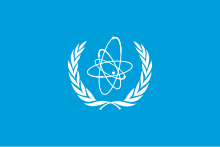
- Since the Chernobyl accident, we have worked all over the globe to raise nuclear safety performance. And since the September 2001 terrorist attacks, we have worked with even greater intensity on nuclear security. On both fronts, we have built an international network of legal norms and performance standards. But our most tangible impact has been on the ground. Hundreds of missions, in every part of the world, with international experts making sure nuclear activities are safe and secure.
I am very proud of the 2,300 hard working men and women that make up the IAEA staff — the colleagues with whom I share this honour. Some of them are here with me today. We come from over 90 countries. We bring many different perspectives to our work. Our diversity is our strength.
We are limited in our authority. We have a very modest budget. And we have no armies.
But armed with the strength of our convictions, we will continue to speak truth to power. And we will continue to carry out our mandate with independence and objectivity.
- The picture I have painted today may have seemed somewhat grim. Let me conclude by telling you why I have hope.
I have hope because the positive aspects of globalization are enabling nations and peoples to become politically, economically and socially interdependent, making war an increasingly unacceptable option.
Among the 25 members of the European Union, the degree of economic and socio-political dependencies has made the prospect of the use of force to resolve differences almost absurd. The same is emerging with regard to the Organization for Security and Co-operation in Europe, with some 55 member countries from Europe, Central Asia and North America. Could these models be expanded to a world model, through the same creative multilateral engagement and active international cooperation, where the strong are just and the weak secure?
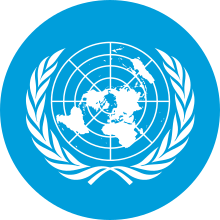
- I have hope because civil society is becoming better informed and more engaged. They are pressing their governments for change — to create democratic societies based on diversity, tolerance and equality. They are proposing creative solutions. They are raising awareness, donating funds, working to transform civic spirit from the local to the global. Working to bring the human family closer together.
- What is required is a new mindset and a change of heart, to be able to see the person across the ocean as our neighbour.
Finally, I have hope because of what I see in my children, and some of their generation.
I took my first trip abroad at the age of 19. My children were even more fortunate than I. They had their first exposure to foreign culture as infants, and they were raised in a multicultural environment. And I can say absolutely that my son and daughter are oblivious to colour and race and nationality. They see no difference between their friends Noriko, Mafupo, Justin, Saulo and Hussam; to them, they are only fellow human beings and good friends.
Globalization, through travel, media and communication, can also help us — as it has with my children and many of their peers — to see each other simply as human beings.
- Imagine what would happen if the nations of the world spent as much on development as on building the machines of war. Imagine a world where every human being would live in freedom and dignity. Imagine a world in which we would shed the same tears when a child dies in Darfur or Vancouver. Imagine a world where we would settle our differences through diplomacy and dialogue and not through bombs or bullets. Imagine if the only nuclear weapons remaining were the relics in our museums. Imagine the legacy we could leave to our children.
Imagine that such a world is within our grasp.
2009
[edit]- Israel is the number one rogue state threat to Middle Eastern peace with its nuclear arms and acts of outright aggression towards its peaceful neighbours Syria and Lebanon – and genocidal actions against the marginalised Palestinians of the West Bank – and Gaza in particular.
- Speaking to reporters, October 7, 2009.[1]
Quotes about ElBaradei
[edit]- At a time when the threat of nuclear arms is again increasing, the Norwegian Nobel Committee wishes to underline that this threat must be met through the broadest possible international cooperation. This principle finds its clearest expression today in the work of the IAEA and its director general. In the nuclear non-proliferation regime, it is the IAEA which ensures that nuclear energy is not misused for military purposes, and the director general has stood out as an unafraid advocate of new measures to strengthen that regime.
- Norwegian Nobel Committee announcement of the 2005 Nobel Peace Prize.
- The overt message is that preventing nuclear proliferation is important...but I think there is a covert message as well: that it is a good idea to have ElBaradei at the IAEA because he was right about Iraq and the administration was wrong... It cannot escape people's attention that this was the man who stood up against the United States and said that Iraq was not reconstituting its nuclear program.
- Ivo Daalder, of the Brookings Institution, The Washington Post (12 December 2004)
- If they think they can get anyone who could have better handled the complex and difficult issues surrounding North Korea, Iran and other controversies, they are not understanding the world right now.
- Gareth Evans, former Australian foreign minister, on previous US opposition to ElBaradei. The Washington Post (12 December 2004)
External links
[edit]- IAEA - Director General's Corner
- ElBaradei welcomes Nobel 'boost' (BBC)
- Nobel Peace Prize Lecture video and transcript
- "IAEA Leader's Phone Tapped" ~ The Washington Post (12 December 2004)
- "U.N. Nuclear Chief Pulled Inspector at Iran's Request" ~ The New York Sun (10 July 2006)
- Neopanora - Nuclear Energy Systems for Sustainable Global Development in the 21st Century


